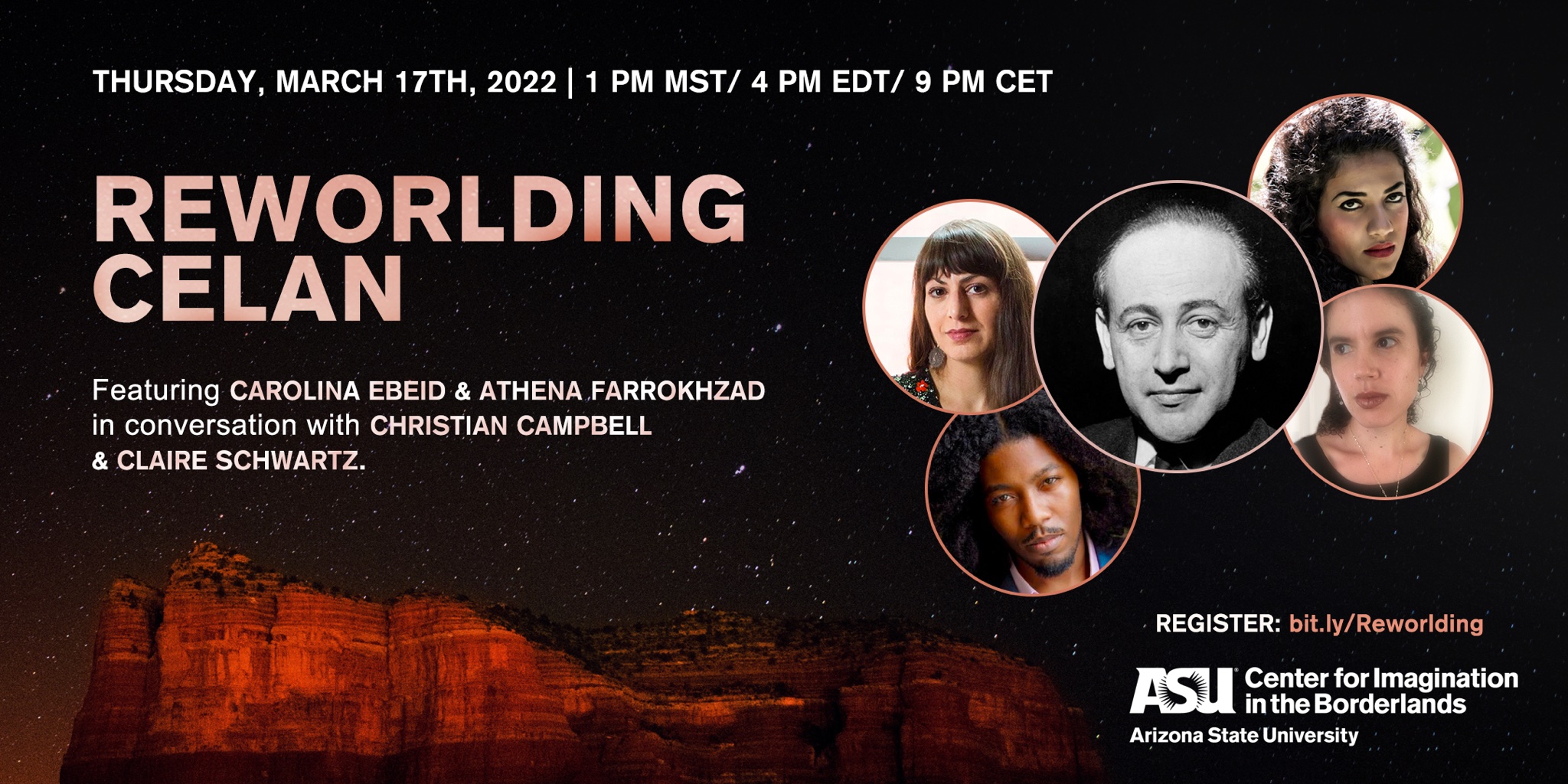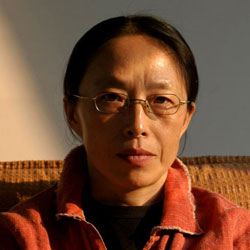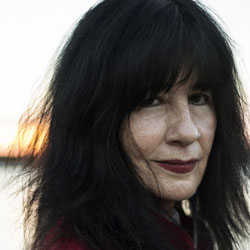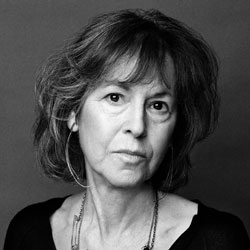2006 Griffin Poetry Prize winner Kamau Brathwaite was born on this date in 1930.
Seeing the Ocean from a Night Flight
Eleanor Goodman translated from the Chinese written by Wang Xiaoni
copyright ©2014
Everything becomes small
only the ocean makes the night’s leather clothes
open up the further out it spreads.
Flying north
to the right is Tianjin
to the left is Beijing
two clusters of moths flinging themselves at fire.
Then the East China Sea suddenly moves
the wind brings silver bits that can’t be more shattered
and many thick wrinkles whip up
I see the face of the ocean
I see the aged seashore
trembling and hugging the world too tightly.
I have seen death
but never seen death come back to life like that.
Notes on the Poem
This week’s poem from the 2015 Griffin Poetry Prize shortlisted collection, Something Crosses My Mind by Eleanor Goodman translated from the Chinese written by Wang Xiaoni. Of the collection, the judges said: “...In a way nothing much happens in [Wang Xiaoni’s] magic lyricism: the wind blows, the ocean rises, people work or move from one place to another, or wait, or just leave some place, and they have souls (which behave like shadows); someone on a journey sees them, through the window, between one landscape and another, and it’s difficult to know why all this is so moving. Reading her, I found myself repeating Auden’s phrase “About suffering they were never wrong, / The old Masters.” Wang Xiaoni is a terrific contemporary poet gracefully extending the great classical Chinese tradition.” Listen to Eleanor Goodman and Wang Xiaoni read from Something Crosses My Mind here.
Indiana Review Poetry Prize Deadline (judged by Billy-Ray Belcourt)
For our Poetry Prize, send no more than three poems in a single document.
The winner of the prize will be awarded $1000 and publication in an upcoming issue of Indiana Review.
Each paid submission comes with a year-long subscription to Indiana Review. For non-US mailing addressees, please add $12 for postage ($7 for addresses in Canada).
Past Griffin Poetry Prize winner Billy-Ray Belcourt is the judge for the Poetry Prize.
Billy-Ray Belcourt is from the Driftpile Cree Nation. He lives in Vancouver, where he is an Assistant Professor in the School of Creative Writing at the University of British Columbia. His books are THIS WOUND IS A WORLD, NDN COPING MECHANISMS, A HISTORY OF MY BRIEF BODY, and the forthcoming A MINOR CHORUS.
Shab-e She’r Poetry Night: Nowruz Celebration
Featured poets: Tawhida Tanya Evanson & Ayomide Bayowa
Featured dance artist: Paromita Kar
Host: Bänoo Zan
Open Mic Sign-up: 6:45 EST
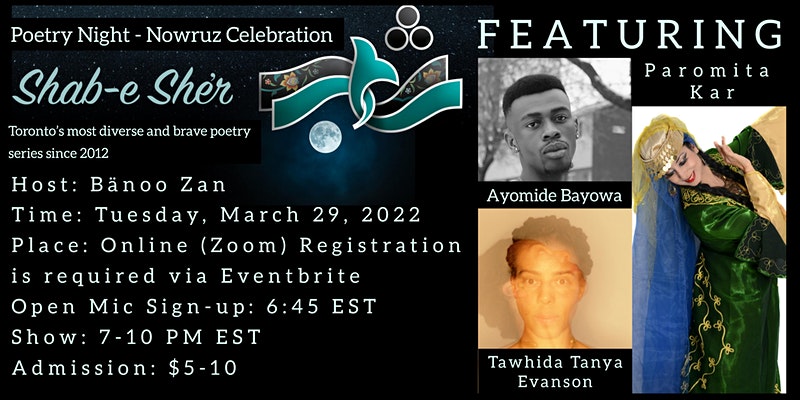
Tawhida Tanya Evanson is a poet, author and multidisciplinary artist. Her two collections are Bothism (Ekstasis 2017) and Nouveau Griot (Frontenac 2018), and her debut novel Book of Wings (Véhicule 2021) was on CBC Canada Reads 2022 Longlist and one of Quill & Quire’s 2021 Books of the Year. With a 25-year practice in spoken word, she performs internationally and has released several albums and videopoems. In 2013, she was Poet of Honour at the Canadian Festival of Spoken Word and received the Golden Beret Award. She is program director of Banff Centre Spoken Word and vice president of the Quebec Writers’ Federation. Based in Tiohtià:ke/Montréal, she moonlights as a whirling dervish.
Ayomide Bayowa is an award-winning Nigerian-Canadian filmmaker, and writer. He is the (2021-24) poet laureate of Mississauga, Ontario, Canada. He set off 2018, as a long list of the Nigerian Students Poetry Prize, shortlist of the Eriata Oribabhor Poetry Prize (EOPP) and the Christopher Okigbo Interuniversity Poetry Prize. He was also a long list of the 2021 Adroit Prize for Poetry, semi-finalist of the 2021 Cave Canem Poetry Prize and second place in the 2021 K. Valerie Connor Poetry Prize (Student Category). His works have appeared in Beyond Words, Barren Magazine, Agbowó, Guesthouse-Lit, Stone of Madness Press, Shallow Tales Review.
Paromita Kar holds a PhD in Dance Studies from York University (2014). She is a professional dancer of traditional Indian dances. Paromita also professionally performs dances of Central Asian dances, including Afghan, Iranian, Tajik and Uzbek dance heritages. She is the choreographer and lead dancer of Ensemble Topaz, a Toronto-based integrated music-dance company, which performs dances and music of South Asia, Central Asia and across the Silk Road. She has performed in Canada, the United States, India, the Netherlands and Czech Republic. Her performances and choreographic work have been featured in a number of festivals, such as Tirgan Festival, Toronto International Dance Festival, Tales from the Silk Road at National Arts Centre, Ottawa; as well as a number of international and Canadian music videos. Her website is: paromitakar.wix.com/danseuse
Talking with the Sun
Joy Harjo
copyright ©2015
I believe in the sun.
In the tangle of human failures of fear, greed, and
forgetfulness, the sun gives me clarity.
When explorers first encountered my people, they called us
heathens, sun worshippers.
They didn’t understand that the sun is a relative, and
illuminates our path on this earth.
After dancing all night in a circle we realize that we are
a part of a larger sense of stars and planets dancing with us
overhead.
When the sun rises at the apex of the ceremony, we are
renewed.
There is no mistaking this connection, though Walmart
might be just down the road.
Humans are vulnerable and rely on the kindnesses of the
earth and the sun; we exist together in a sacred field of
meaning.
Our earth is shifting. We can all see it.
I hear from my Inuit and Yupik relatives up north that
everything has changed. It’s so hot; there is not enough
winter.
Animals are confused. Ice is melting.
The quantum physicists have it right; they are beginning to
think like Indians: everything is connected dynamically
at an intimate level.
When you remember this, then the current wobble of the
earth makes sense. How much more oil can be drained,
Without replacement; without reciprocity?
I walked out of a hotel room just off Times Square at dawn
to find the sun.
It was the fourth morning since the birth of my fourth
granddaughter.
This was the morning I was to present her to the sun, as a
relative, as one of us. It was still dark, overcast as I walked
through Times Square.
I stood beneath a twenty-first century totem pole of symbols
of multinational corporations, made of flash and neon.
The sun rose up over the city but I couldn’t see it amidst the
rain.
Though I was not at home, bundling up the baby to carry
her outside,
I carried this newborn girl within the cradleboard of my
heart.
I held her up and presented her to the sun, so she would be
recognized as a relative,
So that she won’t forget this connection, this promise,
So that we all remember, the sacredness of life.
Notes on the Poem
This week’s poem from the 2016 Griffin Poetry Prize winning collection, Conflict Resolution for Holy Beings (W.W. Norton & Company), by Joy Harjo. Of the collection, the judges said: “...Intermingling Mvskoke storytelling, rock-and-roll lyrics, cityscapes and personal address, Harjo’s poems are at once sweeping in their concerns and intimate in their tone and approach. Harjo’s is a poetics that is not afraid to speak directly when the moment warrants, nor to refer to traditions – literary traditions, folk traditions, musical traditions – with effortless erudition...” Listen to Joy Harjo read from her collection here.
Poetry for Today: Readings by Victoria Chang and Rita Dove
In partnership with the Anisfield-Wolf Book Awards and as the closing event for the 2022 Virginia Festival of the Book, we present poets Victoria Chang (Obit) and Rita Dove (Playlist for the Apocalypse) as they read from and discuss their recent collections. Chang received the 2021 Anisfield-Wolf Book Award for Obit, and Dove is a long-time juror for the AWBA, which was established in 1935 and is the only juried American book prize focusing on works that address racism and diversity.
As part of the 2022 Virginia Festival of the Book, this event is FREE to attend and open to the public. THIS IS AN IN-PERSON EVENT. Book sales and signing will follow.
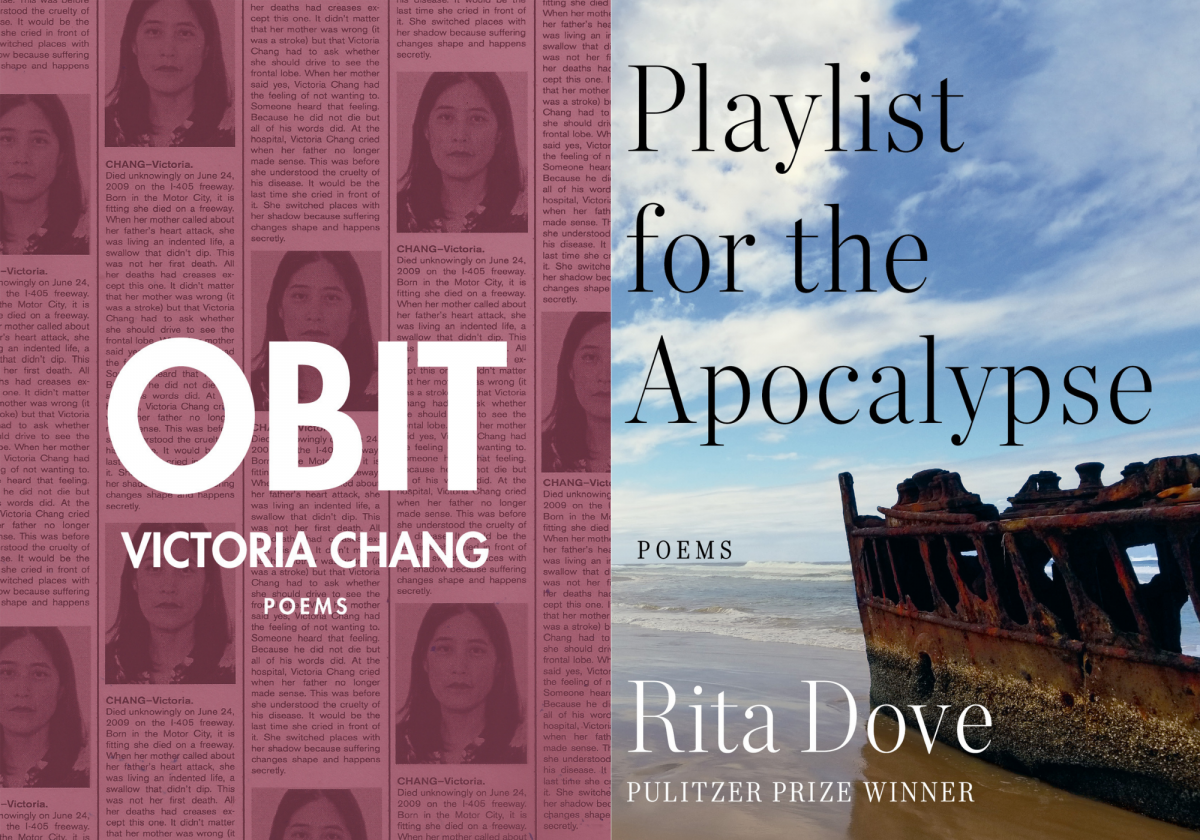
Fluid Vessels – Poetry Reading Series 2022
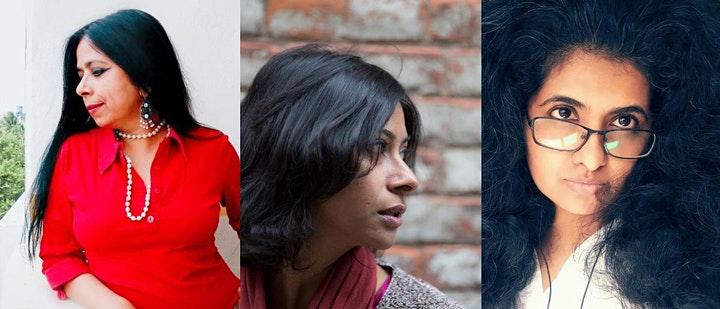
Solitude
Louise Glück
copyright ©2009
The earth has vanished.
There’s nothing to see, only the rain
gleaming against the dark windows.
This is the resting place, where nothing moves —
Now we return to what we were,
animals living in darkness
without language or vision —
Nothing proves I’m alive.
There is only the rain, the rain is endless.
Notes on the Poem
This week’s poem is from the 2010 Griffin Poetry Prize-shortlisted collection, A Village Life, by Louise Glück (Farrar, Straus and Giroux). Of the collection, the judges said: “In A Village Life, Louise Glück presents us with a choir of voices whose song enacts and contemplates our human quest for the very happiness that — as if instinctively — we refuse. The result is a restlessness that seems never to leave us, as Glück suggests in “In the Café”: “It’s natural to be tired of earth. / When you’ve been dead this long, you’ll probably be tired of heaven. / You do what you can do in a place / but after a while you exhaust that place, / so you long for rescue.” This clarity of wisdom everywhere punctuates these poems which, even as they concern restlessness, are cast in long lines shot through with imagery of pristine, archetypal simplicity producing a cinematic stillness; one thinks of the camera in a Bergman film." Listen to Louise Glück read from her collection here.
Drink the Wild Air: Creative Writing Retreat for Youth
Drink the Wild Air is a Creative Writing Retreat for Youth ages 11 – 19. Typically nestled in the gateway to the rocky mountains in Kananaskis country, this year we’ll come together online to take workshops with working professionals, play games, share our stories, our songs, our poems and our art. Join us on March 18th for orientation, and on March 19th and 20th for a weekend of creative razzmatazz, hijinks, capers, and general hullabaloo.
Organized by the Writer’s Guild of Alberta.

Reworlding Celan
The Center for Imagination in the Borderlands invites you and your students to Reworlding Celan. This conversation brings together poets Carolina Ebeid and Athena Farrokhzad for a grounding with Matakyev Fellows Christian Campbell and Claire Schwartz about the meanings and possibilities of living with the work of Jewish German-language poet Paul Celan. In the wake of Celan’s centennial in 2020, this online gathering seeks to celebrate his life and reworld his work across borders of language, geography, and material, towards questions of dispossession, state violence, translation, aesthetics, and freedom. What routes might be opened up by bringing Celan’s poetry into conversation with Indigenous and diasporic communities? What new ways of being together can we imagine through and with the poetry of Paul Celan?
1 – 2:30 pm MST
(2 pm MDT / 4 pm EDT / 9 pm CET)
The event will have ASL interpretive services as well as closed captioning.
Imagined by Christian Campbell, curated by Christian Campbell & Claire Schwartz
